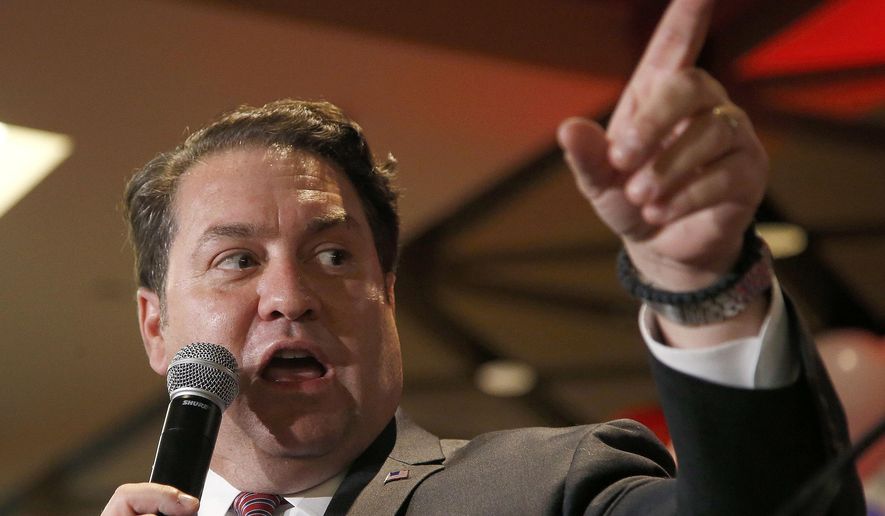If an illegal immigrant were found near a school, ICE officers would generally be barred from arresting him.
But when it comes to placing detention facilities, U.S. Immigration and Customs Enforcement does not appear to have any analogous policies protecting the community.
Arizona Attorney General Mark Brnovich is demanding ICE rethink that.
In a letter last week to ICE and its overseers at Homeland Security, the Republican official objected to plans to turn a hotel in Scottsdale into a short-term processing center for the illegal immigrant families who are streaming into the country during the current border surge.
Mr. Brnovich said he worried about risks of coronavirus, and speculated that dangerous migrants could be released directly into a community that’s not prepared to handle them.
“This does not appear to be a good location,” the attorney general said in his letter. “The hotel property is literally adjacent to an apartment complex and near a senior living facility. It is also across the street from a residential neighborhood and another apartment complex. It is less than a block from a high school, less than one mile from a preschool and less than two miles from a middle school.”
The facility is part of ICE’s contract with Endeavors Inc., which must come up with 1,239 beds to hold family migrants while in processing — or what ICE calls “emergency shelter beds.”
The migrants are expected to be in the beds for about 72 hours, or just long enough to give them a health screening, do quick records checks, and then release them.
ICE said it works with local organizations to try to have food, clothing and options for transportation available when the migrants are released.
Mr. Brnovich, in his letter, asked ICE whether it would make sure people with criminal records weren’t released into communities. He also wondered about children who may have suffered trauma, and urged that the Arizona Department of Child Safety be looped in on those cases.
He also questioned why ICE’s sensitive locations policy protects illegal immigrants from arrest, but doesn’t appear to protect communities from illegal immigrants.
Jessica Vaughan, policy studies director at the Center for Immigration Services, said there is a “possibility of escape” from the hotels converted into detention facilities, and said ICE should have a sensitive locations policy.
“They’re more interested in creating safe zones for illegal aliens than they are for American citizens and other legal residents in the areas where they’re trying to put these facilities,” she said.
ICE in recent years has run three facilities dedicated to holding illegal immigrant families in longer-term detention.
One, in Pennsylvania, was emptied earlier this year. The other two, both in Texas, have been converted to 72-hour family facilities, just like the hotels will be.
Ms. Vaughan, who visited one of the facilities, said it was in a remote location for good reason, both for the safety of the detainees and the community.
“We don’t find jails put into residential areas near preschools or schools for that same reason,” she said.
The families in custody are parents and children who jumped the border but who aren’t being returned to Mexico, despite a coronavirus pandemic health order.
Tens of thousands of family members weren’t expelled in May.
The Trump administration started using hotels to house illegal immigrant children during the pandemic, and ICE now has to report regularly to a federal judge about the conditions.
As of May 28, 630 children who arrived as part of families were in being held — 500 of them in official ICE facilities, 129 in the expanded beds in hotels and one in a juvenile detention center, according to court documents filed Friday.
The document, prepared by ICE’s juvenile coordinator, said 15 hotels are currently housing families with children, and another two are slated to come online.
The names are redacted so it’s not clear whether the Scottsdale location Mr. Brnovich is objecting to is among them.
The hotels are being run under a no-bid contract with Endeavors.
Republicans have called the contract fishy, saying Endeavors had never done this sort of business with ICE, the size of the contract is beyond the company’s abilities, and its award came just after Endeavors hired a former senior ICE official.
Homeland Security’s inspector general is investigating.
ICE recently issued a Request for Information notice covering the same areas as the Endeavors contract, suggesting the agency is taking a more expanded approach ahead of its next contract for supplemental detention facilities for the border surge.
The notice says ICE would “ideally” want 2,000 beds, and envisions the contract running at least six months. That suggests the government anticipates the current border surge lasting well into the future.
• Stephen Dinan can be reached at sdinan@washingtontimes.com.




Please read our comment policy before commenting.